#household gods
Text
The Hearthstone God
[The sequel to the God of Prophecy, and the Serpent God of Protection]
---
Fire is out of fashion, in this new age.
Some of my kind have found new homes, new names, in factories or forges, in the hearts of wildfires or crystals or volcanoes.
Most of us are simply forgotten.
I was a fire god, once. A god of gathering, a god of communion, a god of song and story. But there are no hearthstones now. No fires around which families gather to eat and talk and tell stories.
I am lucky. I am tied to a great flat stone near a lake. A lake that has survived all the wild exuberance of men, when they learned to change the world around them. Once, this was a place where travellers stopped to rest. At first they travelled on their feet, or on half-wild horses. Then there were carts, and a road. Much later, cars drove down the road. The road was paved.
But some things do not change. People need clean water to drink, and the spring here is good. They need to rest, when they are weary. And even now, when they come to camp in nylon tents, to fish in the lake, or to hunt the ducks, or drive camper-vans to the flat place, their ancient instincts wake, and they turn to fire once more. They light new fires atop my stone, so flat and safe, from which no log will roll to set the woods afire.
Not so many come now. Camping is less popular these days. But some still come. Some still light their fires, and settle around my stone, and talk, or listen to music, or tell stories. So I survive, just barely, on the edges of belief.
I feel it, when things begin to change. Something is happening. Something is drawing old gods back. Not the great ones, risen beyond mortal understanding, but the oldest gods, the small gods, those who rose when humankind were still learning what they were.
Far to the west of me, a god even more ancient than I wakes, and begins to hunt again. I remember the stories that were once told of that old serpent, and tell them over to myself in the long fireless nights.
A god of prophecy, not of this land, settles south and west, and I remember tales of ancient ravens, their wisdom and their guile and their sharp, sharp eyes. There was a raven clan once, who passed this way in the days of skin garments and stone tools, but I have forgotten their name. I only remember the symbol they wore, the black bird with its spread wings, marked in charcoal or charring on wooden talismans or leather garments.
I wait, to see who will awaken next.
To my great surprise, it is me.
The people who come this time aren’t like the campers. They come at night, a ragged family group with few blood ties between them, with a single tent and few possessions carried on devices I haven’t seen before. Bicycles, they’re called, slung over with bags the way ponies used to be. They come at night, and hide when cars pass on the road.
They light a fire on my stone, with wood scavenged from the forest, and huddle around its warmth. They don’t speak much, not at first, but they say enough. They have no home, I learn. They are travellers of a kind I have not known before, who are allowed to stop nowhere, but have no goal but a place to rest. They are thin, and worn, and so tired. So very tired.
They need a hearth.
I am only a weak shadow of a god, now, who once recorded the songs and stories of a thousand generations in my ancient stone, but I am still a god of fire. Their fire burns slow, their little fuel lasting well. The food they heat over it sustains them better. The water of that spring, my spring, puts a little life back in them. This stone has lain in this place since great monsters walked this world, since before humans spoke words to one another, and I came into being with the first fire that burned on it. I am old, old, and though weak, I am not powerless.
They stay.
I cannot speak to them. I am old, and weak, and they do not believe. But slowly, with the power of the fires they build every night, with the tiny offerings of scraps of food spilled into the flames, with their growing confidence in the safety of this place, I am able to do more. I give them dreams and they find the cave not far away, where they can hide. They dream of fish, and begin to try to catch some. A woman remembers that some of the local plants are safe to eat, when I slowly wake a long-forgotten memory of a camping trip from her childhood.
And then a child, a strange, quiet child who rarely speaks, a child without mother or father, in the care of an older brother who is exhausted to the very edge of death but cannot give up while she needs him… that child begins to hear.
She sits on my stone, sometimes for hours, not moving or speaking. It worries the others, but at least she is quiet, at least she is no trouble, and they are beginning to associate their hearth with safety. So they let her sit.
She is *listening*. She is listening to the sound of the water, to the sounds of the forest, to the wind blowing. And because she is listening, where no-one else has listened for so long, I sing to her. I sing to her the songs of thousands of years. From the wordless music of the earliest people, who sang what was in their hearts without words, to the songs I have learned from the fishermen with their radios and bluetooth speakers.
I do not know if she hears me, for some time. But then, one night, while they sit around their fire and eat food the oldest have almost certainly stolen, she sings one of my songs. “In a cavern… on a canyon… excavating for a mine…” she sings in a small voice. The others are startled, confused, for she has not spoken aloud since some bad thing they do not name happened, but one of the older ones knows the song and sings with her.
I have always liked ‘Clementine’. It’s been popular with campers for a long time.
The next day, while she sits on my stone, she sings along to one of the wordless songs the Raven People whose name I no longer remember once sang. It is a lullaby, a soft croon to soothe an infant, passed from mother to mother, and she seems to take pleasure in it.
She can hear me. She can even answer me, as the voice driven away by pain and fear begins to return. And so I grow stronger still. Strong enough to make the raven sign on the stone, one day, in the ashes of the fire of the night before.
She takes a half burned stick, and draws the sign on the stone. Pleased, I show her another sign, a leaping fish. She draws that too.
Soon, I need not shift the ashes. I can show her the pictures in her mind, and she draws them. She draws the wheel of a cart, and into her heart I whisper the stories the travellers in covered wagons once told over my stone. She draws a fish, and I make her laugh silently with the jests of fishermen who boast of fish who escaped them. She draws a horse, and I tell her about the wild horses who once drank at this lake, about the men and women who captured and tamed them and rode them through the forest when it was far greater than it is now. She draws a long-toothed cat, and I show her the great cat that once slept on my stone, and denned in the cave where her new found family sleep.
One night, when all the others are asleep and my fire has burned down to coals, she creeps back to the stone and looks into the coals. “Who are you?” she asks. “Are you real?”
She is afraid that the voice in her mind is the voice of madness, a lie created by a mind that does not work like other minds, that has endured great hardship. I do not want this child to be afraid. To instill fear runs counter to my very nature, save in whoever might threaten those my hearth protects.
I am a god of the hearth. I am a god of food, and communication, and peace, and safety. I am all the things that fire used to mean, before humans learned again to fear the thing they had tamed. I do not often take a form, for fire is my form, but for her I must try.
There was a wise woman once, who knew me, whose clan visited this lake several times every year. I watched her grow up, and grow old. I watched her learn of the god of the fire stone, and I watched her teach others. She slept beside me as a child, and as a woman. She sang her children to sleep beside me, and her grandchildren, and dozed beside me as an old, old woman. To her, I was represented by a sign of a flame in an oval, a fire and a stone.
I build a likeness of her out of the light of the coals and the shadows of smoke, a child with straight dark hair and a simple tunic, and in lines of light I draw the sign of the fire and the stone on the outlined chest. “I am the fire,” I tell her, “and the stone. I am all the fires that have ever burned here, all the stories told, all the songs sung, all the meals eaten. I am the traveler’s hearth, and the rest for the weary, and this is my place.”
“Piedra de fuego,” she says, tracing the symbol with her finger in the air. “The fire stone.”
“Yes. I am the god of this place.”
She frowns at this. “My brother says that God is in the sky.”
“Many gods are in the sky.” I cannot continue to hold the form of the girl, but the coals shift to make my sign. “I am not. I am here. I have always been here, since the first people built a fire on my stone, and warmed themselves.”
She nods slowly. “You are… a small god,” she says thoughtfully. “A place god. Like in movies.”
“Yes.” I’ve heard of movies, which are a new way of telling old, old stories. “Old places, important places, often have gods. And gods who are forgotten return to their old places and wait, until someone believes again.”
“Will you protect us?” she asks. “When the police come, to tell us to move on?”
“I am not strong,” I tell her sadly. “I cannot make men go away from here, if they are dangerous, or even call game here for you as I once did. But what I can do, I will do.”
She sits watching the coals for a long time, thinking. “Can we make you stronger?”
I think too, and she waits patiently. “You have already made me stronger. You listened. You believed. If you can convince the others to believe, that will make me stronger still.”
She sighed. “They don’t believe in anything, anymore. Not good things.”
It is a sad thing, that she knows that. They’ve been trying to hide it from her. “Then,” I tell her, “that means there is a place in their hearts that is ready for me. I am not hope. I am not a happy ending. I am not a god in the sky. I am a stone, and a fire, and a song. I am *real*. They can believe in what is real.”
The next night, she asks for a story, and one of the adults tells her an old fairy-tale from a country far away.
The next night, again, she asks for a story, and another adult tells a funny story about his childhood.
On the third night, she asks her brother to tell her a story. He tries, but he is so tired - not physically, but emotionally - that he runs out of words. So she lays her hand on his arm and offers to tell him a story, instead.
And she tells them all a story about a stone near a lake, flat and strong, that people wearing uncured skins and carrying flint weapons built a fire on. She tells of centuries passing, of people coming to the lake on their feet, on horses, in carts and wagons, in cars and motor-homes. Of thousands of years of fires, of people gathered around them, of the great continuity of humanity, and the Piedra De Fuego that has lain in this place since time began, listening to the stories and the songs and the voices of people long gone. Somewhere in the stone, she says, laying her hand on it, all those stories are remembered. All those songs are still sung. And it will remember us too.
I don’t know if it will work. But I was right. People need to believe in something. They need something to hold onto, when times are hard, when the ties of community and family are broken and they feel alone. And a stone thousands of years old, and a fire endlessly renewed on that stone, always new… that is real. They touch me, and think of those who came before, of thousands of years of history meeting them in this place, and they feel less alone.
It’s not much, not yet. But it is something. My nature, my existence, as explained to them by my small, strange priestess, is a slender lifeline flung to those who are adrift, a tiny certainty in a world they do not trust. And the more they believe in that lifeline, that certainty, then the more they believe in me. I *am* growing stronger.
When the police come, I will not be able to make them leave… but I think I am strong enough now to hide my people from unkind eyes. And if I can do that, then their faith will grow.
Tonight, three more people come. A mother and two children, weary and beaten down with hardship. My people welcome them, give them fish and greens grown by the lake, speak kindly to them. And when they have eaten, my little priestess sits between the two children and tells them a story of a stone, and a fire, and thousands of years of stories and songs, and she sings a wordless lullaby six thousand years forgotten, but living again in a child who draws the sign of the Raven in the dirt while she sings, and the sign of the fire on the stone.
And I grow a little stronger.
#short fiction#original story#i aten't dead#the old gods#small gods#household gods#forgotten gods who do not forget
3K notes
·
View notes
Text
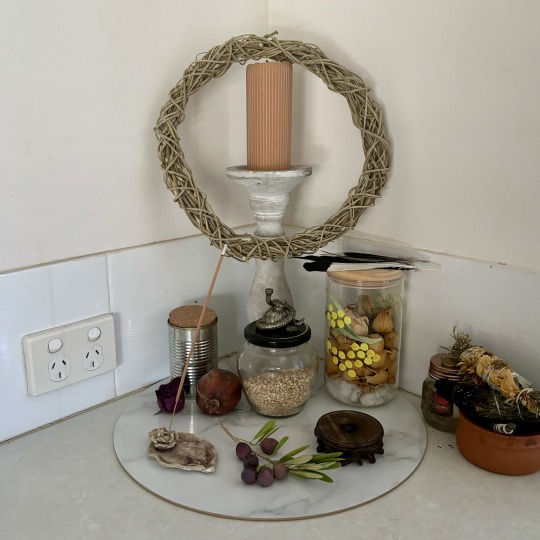
My home feels warm and whole with your nearness, virtuous ephestioi. Like the scent of this incense filling this home, may you fill it with your healthful and abundant blessings.
44 notes
·
View notes
Text
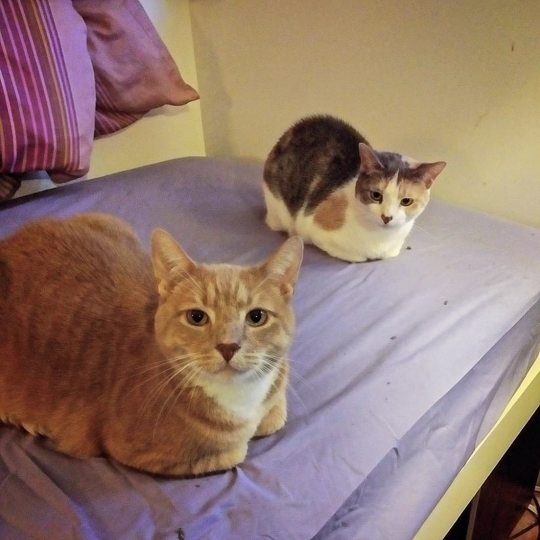
The apartment is undergoing a massive cleaning. Jones & Nell have mostly been hiding. But during lunch break, they appeared, still stunned enough to hang out this close without fighting.
21 notes
·
View notes
Text
"I turn at last to the gods situated in and around the house. From various allusions in the Homeric Hymns—not of course in the main Athenian texts— we learn that Hestia has ‘an everlasting seat’ in ‘the middle’ of the house of every mortal, and receives the first and last libation at every banquet; like her friend Hermes she ‘lives in the fair houses’ of men. Early in the fifth century the East Locrians still spoke of a household or family as a hearth. The hearth remained the symbolic centre of the Athenian household, to which new members of all types were in different ways introduced. Brides (but also grooms) and newly bought slaves were led to it, made to sit, and greeted with a shower of light foodstuffs such as nuts and figs ‘as a symbol of prosperity’; children were informally acknowledged a few days after birth at the Amphidromia, which took its name from an act of ‘running around’ the hearth. Offerings to Hestia were in theory shared only among members of the household, if we may trust the explanation offered of the proverb ‘he’s sacrificing to Hestia’, which meant ‘you’ll get nothing from him’. The dying Alcestis in Euripides entrusts her children to the charge of Hestia in a moving prayer. … The wife of the exiled general Phocion prayed to ‘dear hearth’ and laid beside it the remains of her husband, brought home at last from Megara. Hestia, the fixed centre, can be seen as a symbol of the oikos’ continuity over time. The child is born of a mother presented to the hearth, and is presented to the hearth itself; the boy child eventually leads a bride ‘from her paternal hearth’ to his own and begets a child to perpetuate the process, the girl child eventually goes out to another hearth in exchange. …
Hestia sat in the seclusion of the oikos, like the women who guarded its property, and may have been seen as stewardess of its riches. (She bears that title, though in a public context, in Hellenistic Cos. But the power explicitly associated with the wealth of the household was a different god, Zeus Ktesios. ‘If the property of a house is destroyed, it may be replaced, by grace of Zeus Ktesios, says the Argive king in Aeschylus’ Supplices (443–4); rage seizes me, says a character in Menander, ‘when I see a parasite entering the women’s quarters, and Zeus Ktesios not keeping the storeroom locked, and little whores running in’. Zeus Ktesios was concerned, therefore, both with the acquisition of property and with its preservation, in that storeroom where his own image was set. A typical prayer to him was ‘to grant health and prosperous acquisition/ ownership’. … One of the rare surviving fragments of exegetical literature concerns his cult: ‘This is how to set us symbols of Zeus Ktesios’. What follows is corrupt in detail, but the main action certainly concerned a new two-handled jar with a lid, which was to be hung with white wool and filled with a mixture, known as ‘ambrosia’, of pure water, olive oil and ‘all fruits’. Pots were sometimes used, perhaps as foundation offerings, to ‘set up’ statues, but it looks as if the jars of Zeus Ktesios were themselves the tokens of the god’s presence, the only ones apart perhaps from small altars. If so, Zeus Ktesios was within the means of any household. …
Zeus Herkeios is more complicated. Every candidate for an archonship at Athens was asked ‘if he had an Apollo Patroos and a Zeus Herkeios, and where these shrines were’. Every citizen—or at least every citizen from the higher property classes—had therefore an association of some kind with Zeus Herkeios. The herkos is the wall or fence that surrounded the external courtyard of the Homeric house—and by extension the courtyard itself—and we regularly find an altar located there in the Homeric poems and in myths which reflect that world (above all that of the death of Priam). … Possibly the cult of Zeus Herkeios, like that of Apollo Patroos, was attached to the larger kinship groups, phratry or genos (or even to the deme)—as the obscure expression ‘gennetai of Apollo Patroos and Zeus Herkeios’ might suggest. (This would not preclude individual altars in the courtyards of prosperous households.) However this may be, we have a clear item of evidence that for the Athenians Zeus Herkeios was not merely a form of Zeus located conveniently close to hand (as he may appear to be in Homer), nor merely a guardian of the physical space of the household, but specifically associated with the social ties holding together the close family. ‘Whether she is my sister’s child or closer in blood than the whole (family linked by) Zeus Herkeios, she and her sister shall not escape a dreadful death’, says Sophocles’ Creon, terribly, of his niece Antigone. Demaratus’ appeal to his mother by Zeus Herkeios to tell the truth about his birth implies something similar.
In the porch of many Athenian houses stood some among three further gods. Apollo Aguieus is familiar to readers of drama, but the physical form in which he was manifested is controversial. An ‘Aguieus’ was, according to lexicographers, a ‘pillar ending in a post’, a ‘conical pillar’. But some ancients believed that these pillars were ‘proper to the Dorians’ and that the Athenians had altars instead: in Harpocration’s words, ‘the Aguieus mentioned by Attic authors must be the altars in front of the houses mentioned by Kratinos and Menander and Sophocles in the Laokoon, where he says, transferring Athenian customs to Troy, The aguieus altar gleams with fire, steaming with drops of myrrh, perfumes of the barbarians.’ Certainly, it is not strictly demonstrated that the Attic Aguieus was a pointed column, of the kind that can be seen on the coins of (for instance) Megara and Apollonia. But greetings such as ‘lord Aguieus, neighbour, guardian of my front door’, common in tragedy and comedy, imply the presence of an emblem of the god, not an altar alone. …
A comic oracle in Aristophanes declares that one day every one of the litigious Athenians will have a little private law court outside his porch ‘like a Hecataeum everywhere in front of the doors’. Small Hecataea have been found in Attica in good numbers, though perhaps few if any antedate the Hellenistic period. Almost all take the form of the ‘triple-bodied Hecate’ round a pillar, an iconographical type said by Pausanias (whom archaeology has not refuted) to have been invented by Alcamenes in the second half of the fifth century ‘for the Hekate Epipurgidia of the Athenian acropolis’. … How frequent Hecataea may have been we do not know. We can apply to them the usefully vague expression applied by Thucydides to the last of the doorstep gods, the ‘stone herms of native, four-cornered form’: of these, he said, there stood in the city of Athens ‘many, both outside private houses and in shrines’. …
The main household gods have now been reviewed. Hestia is the oikos itself, its permanence; Zeus Ktesios its wealth; Zeus Herkeios (wherever precisely located) the bond of kinship. The gods of the porch have something to do with the transition from the private space of the house to the public world. Hermes promises safe journeys (though he may also have some connection with the material prosperity of the house); Apollo and Hecate are probably there as protectors from intrusive evil. Hecate was herself an ambiguous figure, and by planting her as a protectress at the threshold one perhaps insisted that she did not enter the house. It was no amiable trait in Euripides’ Medea to have a Hecate who ‘lives in the recesses of my hearth’, actually within the house."
- Polytheism and Society at Athens by Robert Parker
#greek gods#hestia#zeus#apollon#apollo#hermes#hekate#hecate#ancient greek religion#ancestral gods#household gods#ancient athens#excerpts#quotes
13 notes
·
View notes
Text
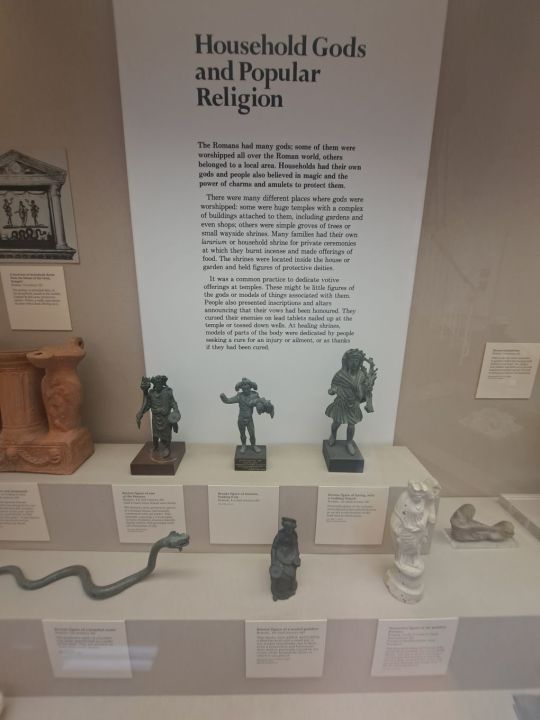
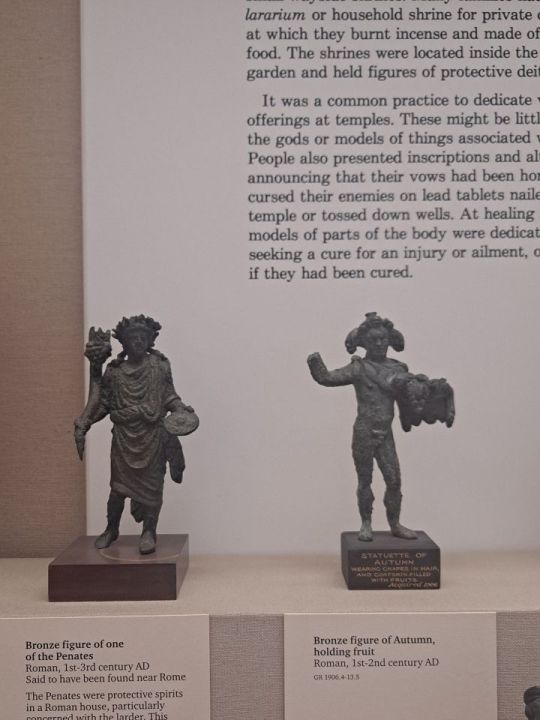
Roman Household gods
* 1st-3rd century CE
* British Museum
London, July 2022
68 notes
·
View notes
Text
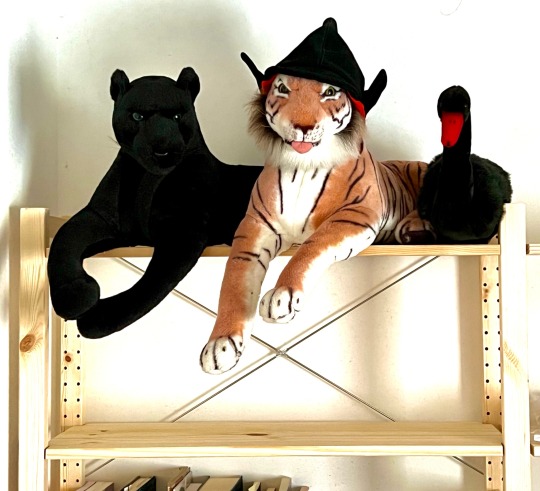
household gods freshly installed in the bedroom - left to right is
The Black Panther
Nkoë the tiger
Fionnghuala the black swan
all they/them pronouns - photo doesn't do justice to how glossy The Black Panther is
and yes they are getting a band together
#household gods#pronunciations#ng-ko-eh#fin-wah-la#or fin-ooh-la#depends where in ireland#all stressed on 2nd syllable
5 notes
·
View notes
Text

they are the kami of spare change and little bits of bright plastic i find on the street and they dream nightly of a golden age of cracker jacks and payphones
#coin jar#magpie#horde#shiny shiny#household gods#i want to empty it out and start over but then they give me that look and i cant do it#idiolects#the thing about dying that no one ever talks about#the thing about harry#the thing about jellyfish#the thing from another world#the thing#i want to be a turtle when i grow up#coins#change#be the spare change and colorful bits of plastic you want to see in the world#darn tough#shelves#landing zone#landing on mars#legacy#legless#north fulton county#georgia#end of message
29 notes
·
View notes
Text

1 note
·
View note
Text
the best part about being a Girl Who Knows A Lot About Star Wars is that you can fuck with dudes so much. no guy has ever been able to refute my backed claim that moff tarkin canonically had sex with a stormtrooper. why? because doing so would force them to admit they've never read 'of mouse droids and men' and therefore know less about star wars than me: a girls' girl who thinks that luke skywalker and the mandalorian "are probably in an open relationship".
#my housemate should know better at this point#i fully told him that i was doubling down to fuck with him and dont actually give a shit#but on GOD he still gets so mad whenever i say luke is gay#and thats on living in a fully autistic household#star wars#ahsoka
7K notes
·
View notes
Text

these tags have been bothering me for a few days now. i understand wanting some private time at home with your partner, but can you not see that this is EXACTLY the attitude i'm talking about?
does your third housemate ALSO get an allotted time where you and your partner have to leave, or is it only for you? is this something you coordinate on days when your housemate is already independently making other plans, or are you just expecting to be able to kick them out of the house at will like this is a college dorm room?
this isn't a situation where you are three equal parties building a life, this is you and your partner treating someone else like a third wheel you wish would go away and a money bank to help you pay your bills. if that works for all parties involved then it's no skin off my nose, but can't you see that this is literally not at all the situation that i was describing? i'll make a very personal post about how it hurts when people act like my housemates would be justified in trying to get rid of me and alloromantic people will literally be like "this sounds great—as long as i can get rid of you!" like do y'all hear yourselves. do you actually see the words when aros post or is it just static for you.
this is the way people talk about their children, how they want their children out of the house so they can have some alone time. not the way you should be talking about a fellow adult who literally pays for and whose name is on the deed of the house you all live in. aro people aren't housepets.
#op#god this fucking sucks. can y'all get some self awareness#alloros mind your own fucking business challenge!! learn to read the room!! it was a personal post!!#(this does not apply to anyone who reblogged agreeing w how stupid the nuclear family model is#and sharing their own similar households you are all genuinely sosososo cool)#i like solidarity i just don't like people trivializing and missing the point of everything i say!
460 notes
·
View notes
Text
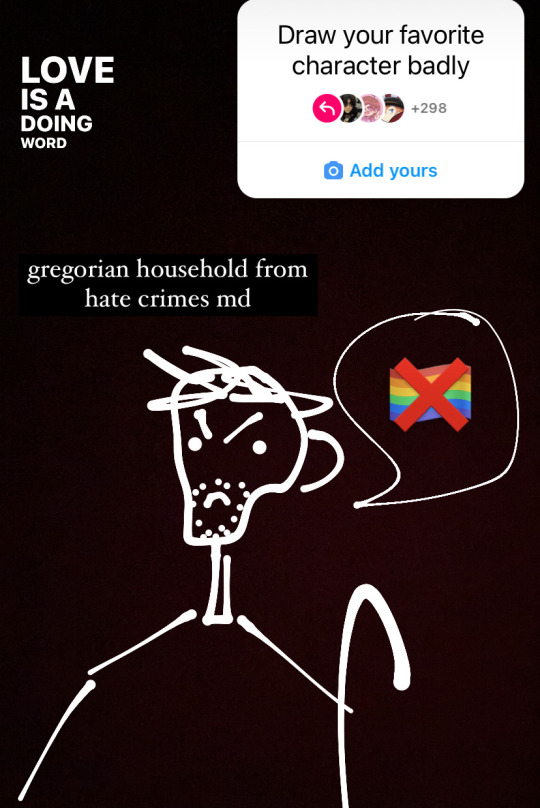
my contribution to the house md tumblr today. tomorrow i will offer nothing. (I just had exams and a choir concert, have mercy on me.)
#greg house#gregory house#gregorian household#house md#dr house#hate crimes md#mouse bites#!!#I’m so exhausted#guys pls have mercy#I’ve been Goin Thru It lately#in house md I trust#my Primary coping skill#i am cringe but i am free#this show is my Vicodin#crazy statement#pls keep making content I’m so drained that I haven’t been writing essay comments to creators but#god I love you all#smooches /p#house md content is my <3#Hugh Laurie#Lucas rants
135 notes
·
View notes
Text

Ms. Nelson aka Nell aka Nelly aka Nell-Bean aka Beanlet.
Household God for 7 years now. Sometimes standoffish, but going through a cuddle phase at the moment, so had to get a picture.
12 notes
·
View notes
Text
“Finally, Zeus Soter was an important god of the household. With other deities such as Hygieia (Health) and Agathos Daimon (the Good God), he traditionally received the third libation at symposia. The first libation was poured to Zeus and the Olympian gods, who represent the cosmos; the second to the heroes, who stand for the city; and the third to Zeus Soter, the patron of home and family. In his Suppliants and Oresteia, Aeschylus alludes several times to Zeus Soter as the deity who upholds the authority of the male head of the household, and the physical integrity of the home itself, which were felt to be interdependent.11
Because of his position as head of the divine family of Olympian deities, Zeus was the archetype of the patriarchal father. In myth, Zeus’ many amorous alliances with mortal women produced heroes, who gave rise to aristocratic lineages. Thus he was worshiped as Zeus Patroös (Ancestor) by Dorians, who traced their lineage to his son Herakles, and more generally as a god of familial bonds. At Athens, Zeus Phratrios and Athena Phratria presided over the enrollment of boys into the phratries, or brotherhoods, that guaranteed their status as legitimate offspring of citizens. Shrines of individual phratries sometimes had altars dedicated to the pair. But most widespread of all were Zeus’ many domestic cults. Zeus Herkeios (of the Courtyard) received sacrifices on behalf of the household at an open-air altar. An anecdote from Herodotus (6.67–68) illustrates the role that Zeus played as the guarantor of the male line. When confronted by his enemies with claims that he was illegitimate, the Spartan king Demaratos sacrificed to Zeus and brought his mother a portion of the entrails. Placing them in her hand, he beseeched her in the name of Zeus Herkeios to tell him the truth about his parentage, and she complied. Zeus Herkeios is attested as early as Homer (Od. 22.333–37), who mentions that Odysseus and his father sacrifice to the god outside their ancestral home. Zeus’ importance to fathers may also explain the unusual votive offerings uncovered in the hilltop sanctuary at Messapeai near Sparta. The sanctuary of Zeus Messapeus contained weapons, armor, and athletic gear, but these were far outnumbered by crude, handmade clay statuettes of males with huge, erect phalloi. The site was frequented mostly by men, who may have sought Zeus’ aid in becoming fathers.
Zeus Ktesios (of Possessions) was a humbler deity. In Athens, it was customary for the head of the household to wreathe a two-handled jar with wool tufts around its “ears” and “from its right shoulder to its forehead,”and to empty into the jar a mixture of pure water, olive oil, and various fruits and grains, referred to as ambrosia. The finished jar stood in the storeroom as a “sign” of Zeus and acted as a charm to increase the household goods. That the ritual has many points of contact with funerary customs suggests a relationship to domestic ancestor cults. Though he had public altars in some cities, Zeus Ktesios was primarily an intimate, family god. The orator Isaeus (8.16) tells of an Athenian who admitted only family members to the sacrifice for this god, though his practice was not necessarily universal.”
- Ancient Greek Cults: A Guide by Jennifer Larson
5 notes
·
View notes
Text
I don't want your traditional drama that you get from cheating with Spock and T'Pring. I want this.
T'Pring finds out and she just stands there for a couple of minutes then:
T'Pring: I had sexual intercourse with Michael Burnham.
Chapel: *confused*
Laan: *confused because she distantly remembers that being the name of a Mutineer*
Spock: WHAT!!!?!!!!!
Pike: *panicking, desperately trying to find an exit, falls on floor, has heart attack*
#t'pring#star trek#michael burnham#star trek discovery#star trek snw#s'chn t'gai spock#spock#strange new worlds#christine chapel#christopher pike#laan noonien singh#mr. spock#i don't really ship Michael and T'Pring but it just fits in with the family drama of that household#captain pike#Pike needs a holiday away from these people#unfortunately if he does that they'll either destroy or save the universe#s'chn t'gai family drama#s'chn t'gai family#T'Pring deserves better than what Spock is doing to her#god help Spock when Michael find out she'll brake so many laws just to beat his ass
309 notes
·
View notes
Text






wicked twitter 2/?
#wicked#wicked the musical#wicked memes#boq#nessarose thropp#elphaba thropp#galinda upland#fiyero tigelaar#in this household we support:#gelphie#and#fiyeraba#and also#flinda#and also all three of them together god bles :)
124 notes
·
View notes
Text

sorry i havent posted since april have some dreemurrs
#if you saw this already no you didnt bc the quality messed up#kris dreemurr#frisk dreemurr#chara dreemurr#asriel dreemurr#flowey#oh yeah cant forget the ABSOLUTE GOD OF HYPERDEATH#asriel tried to be so edgy and for what LMAO#undertale#deltarune#these four all living in one household at the same time would be insane#love them though ^_^
141 notes
·
View notes